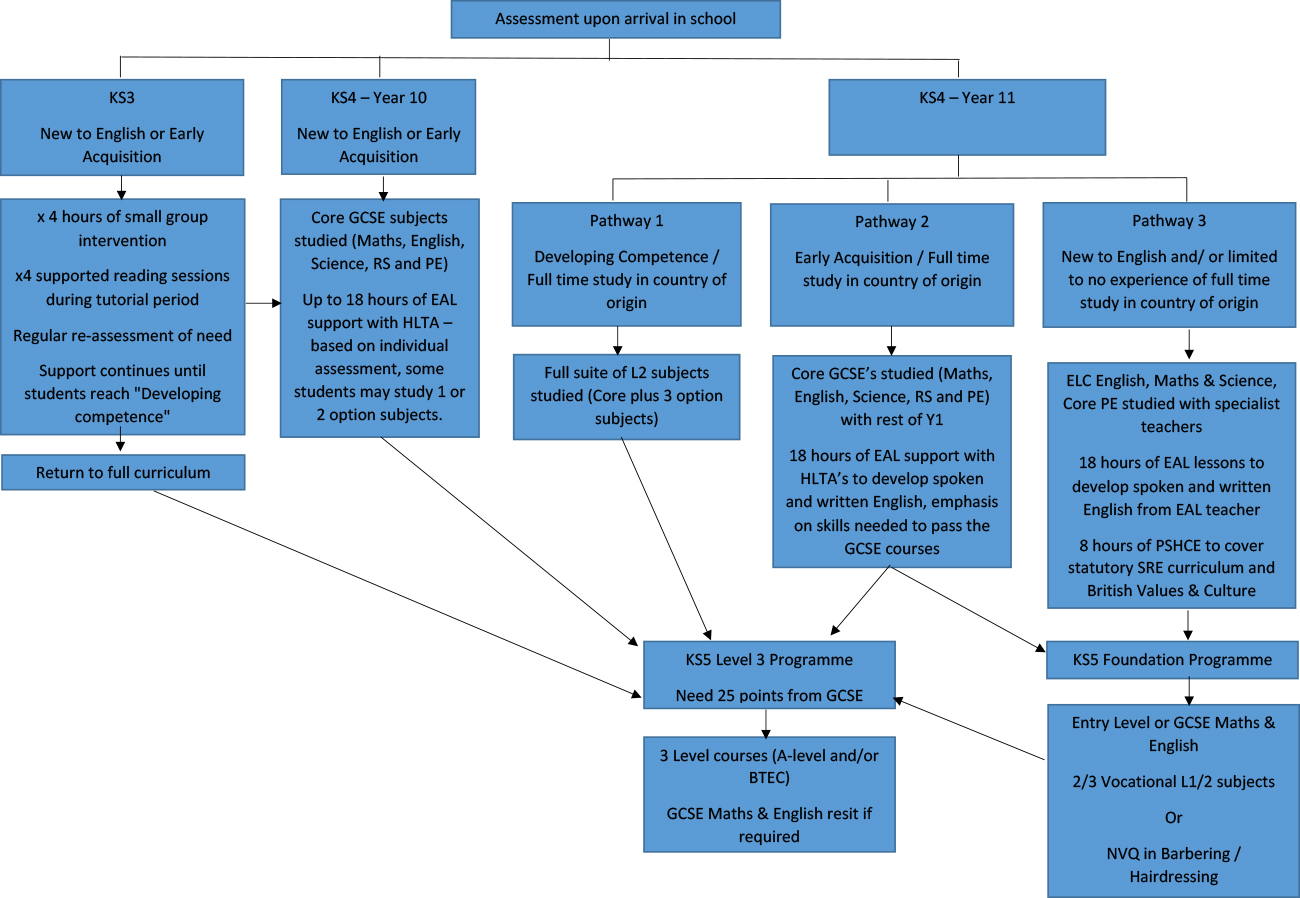How do we ensure accessibility for all? Supporting our EAL Students
Curriculum Intent
We have two main aims, to ensure that students who speak English as an additional language gain the oral and written skills needed to be able to fully integrate into the school and access the full curriculum or alternative pathways and to ensure that our students are able to fully integrate within British society by exploring what it means to be British whilst celebrating their own cultural backgrounds. This will allow every student to be able to go out and work successfully in society, participate fully within their communities and understand how to access all of the relevant support systems and pathways that they will need as independent young people.
Student Learning Journey
When an EAL student arrives at Bishop Stopford’s School, they will complete an initial EAL assessment in Listening, Speaking, Reading and Writing. This is also known as assessing the ‘4 skills’.
This assessment will determine a grade between A0-E9. These grades were established by the Department for Education (DfE) and help identify the English language acquisition for every individual student.
Using what the results tell us about the children, we aim to plan inclusive lessons that meet the needs of all learners.
As a school we offer different pathways across the Key stages.
Key Stage 3
At KS3, students with an overall A0-B4 EAL grade are attending main stream lessons and will receive small group support. Students remain in these small group interventions until the English language acquisition is good enough in all 4 skills to access the main stream teaching fully. Main stream teachers will support the high ability students with the following strategies:
- Planning for language and identifying which language structures will be used
- ‘Expected sentence structures’ modelled
- Opportunities for both exploratory talk and presentational talk
- Vocabulary extension activities
- Model more complex language alternatives
- Graphic organisers/speaking/writing frames to cement and record understanding
During the small group interventions is KS3 and KS4 students will have tailored literacy tasks, handwriting tasks, recall and apply basic vocabulary, learn linguistic oral patterns in English, complete scaffolded and differentiated work, use flashcards and imagery in order to understand a reading task, complete listening triangles, Think-Pair-Share and speaking activities, have an opportunity to partake in role plays, listen to various different speakers and accents.
Key Stage 4
At KS4, students have a variety of different support pathways. These pathways depend upon the level of English spoken and students’ prior educational experience
- Students who have been in full time education prior to moving to the UK and are working towards “Developing Competence” will study a full curriculum with 1 option choice used to receive 6 hours of additional EAL support to maximise literacy development.
- Year 11 aged students who have been in full time education prior to joining and who are at the “Developing Competence” level will integrate into core curriculum GCSE lessons for Maths, English, Science, RS and PE. They receive 18 hours a fortnight of EAL support to ensure that they can further develop their written English skills to support their progress in the core subjects.
- Year 11 aged students who are “New to English” follow a core curriculum of Entry Level English, Maths and Science, they also attend PE for 3 hours a fortnight. They receive 25 hours of EAL support focusing on English language acquisition and PSHCE topics to support integration into the UK.
- Those students with no prior educational experience prior to arriving in the UK receive additional intervention support.
Key Stage 5
At KS5, students will who are working below the Developing Competence Level will continue to receive at least 5 hours of EAL interventions and where appropriate additional sessions to support individual subject needs.
How is EAL taught?
The initial assessment identifies the knowledge about the English language proficiency of learners using EAL, as well as cognitive skills and previous educational experiences.
Basic grammar, vocabulary and everyday English gets assessed. Once we identify where a student is with their learning, we follow a curriculum which is broken down into 13 sub topics. Each topic is differentiated by Beginners (Blue), Elementary (Purple) and additional skills (Green). Aspects of Citizenship and extended writing tasks are also included.
Some students who are high ability learners in 2 skills (e.g. Listening and Speaking) might be able to complete the tasks of Elementary but will need the Beginner tasks in the other 2 skills (e.g. Reading and Writing).
A typical EAL lesson usually has the following structure:
- A starter activity where previously learned vocabulary is recalled and applied
- Differentiated activities in speaking and listening. These often include pair or group work
- A new grammar point which is introduced and applied in a variety of activities
- New life skill opportunities (e.g. filling in a form) /SMSC aspects or celebration of British culture
- A scaffolded reading task
- An opportunity for independent writing or more tailored gaps fill/writing frame opportunities.
Regular assessments take place in order to track students’ progress against the DfE grades for EAL.
Home learning
Homework is usually set once a week for the small group support classes.
Students who are in the full time EAL provision need to complete homework 3 times a week.
Sometimes home learning includes a virtual ‘end of unit test’.

